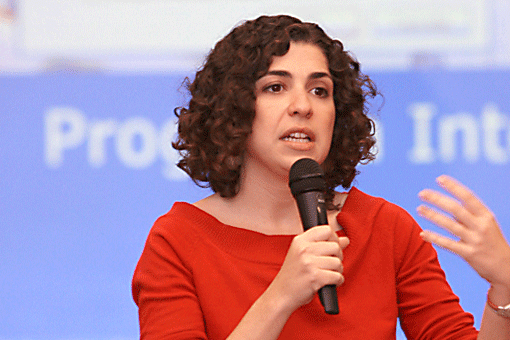As a child, Teca Cozetti Pontual found her grandmother’s stories about life under Brazil’s dictatorship riveting. They also taught her the value of service and dedication to an ideal even under the harshest conditions. Today, at the age of 29, Pontual is putting those lessons to work. As project manager for Ginásio Carioca at the Rio de Janeiro City Department of Education, she is responsible for improving the quality of education for 235,000 middle-school students.
Born in Brazil, Pontual moved to the U.S. with her family at age 14. Attending public schools in New York and Miami gave her an early glimpse of the potential of public education for her homeland. “I came to believe that Brazilian students in the public school system should have access to the same quality of education I did,” she says. “Where you are born doesn’t define your future.”
When she returned home in 2008 after earning a graduate degree at Harvard’s Graduate School of Education, Pontual became the superintendent of monitoring and evaluation for Rio State’s Department of Education. There, she implemented a new evaluation system to provide teachers with data on student progress and to facilitate better understanding of successful teaching mechanisms. Evaluations consisted of standardized testing in math, science and Portuguese. The system, which also provided such incentives as free laptops to high-scoring students, resulted in improved test scores and student retention. Pontual’s success won her high reviews from state education authorities. Her new job represents an even tougher challenge, with her portfolio at Ginásio Carioca including school management, professional development, curriculum reform, evaluation of student progress, and design of achievement indicators.
But Pontual is unfazed by the challenges. Convinced that students should not be victimized by educators’ mismanagement, she is determined to widen horizons at the key middle-school level—including offering extracurricular activities that can boost student confidence and keep them in school, such as dance classes (Pontual once yearned to be a ballerina) and book clubs.
In addition, Pontual hopes to nearly double the amount of time teachers and students spend in the classroom from the current average of four and a half hours per day—a result of teachers having two or more contracts at several schools at a time. Pontual calls the current system “a mess,” with teachers instructing so many students that “they often can’t learn all their names, much less give them personal attention and gear instruction to their specific needs.” Pontual has already begun to increase one-on-one teacher-student interaction in Rio’s schools by extending teacher hours and offering online video instruction.
In the future, Pontual hopes to stay with the city’s Department of Education to see her projects develop. She recognizes that achieving the deep, systemic reforms necessary to create educational equality will require political activism. As far as her own role is concerned, however, she believes “my greatest contribution will be at the technical level, rather than the political one.”






